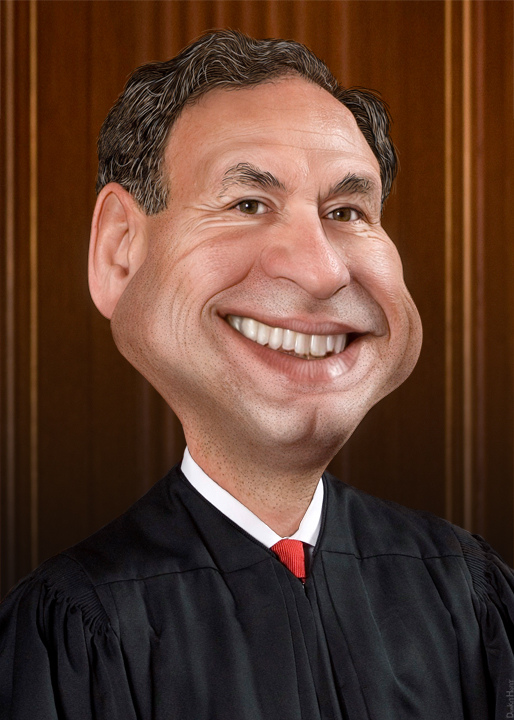The updated version of this post after Obergefell decision can be read here.
Guest post by Daniel Bennett
Could a religious university lose its tax-exempt status over the issue of gay marriage? It’s not as far-fetched as you might think.
In Tuesday’s oral arguments in Obergefell v. Hodges, Solicitor General Donald Verrilli—essentially, the federal government’s attorney—offered the Obama administration’s position on same-sex marriage. Not surprisingly, Verrilli argued that gay marriage bans are unconstitutional and should be struck down.

Samuel Anthony Alito, Jr., aka Sam Alito, is an Associate Justice of the Supreme Court of the United States. Caricature by DonkeyHotey via Flickr Creative Commons
But in a subtle exchange with Justice Alito, Verrilli may have tipped his (and the Obama administration’s) hand on a topic of concern for many religious conservatives: whether a religious college could lose its tax-exempt status by opposing same-sex marriage.
Alito: In the Bob Jones case, the Court held that a college was not entitled to tax-exempt status if it opposed interracial marriage or interracial dating. So would the same apply to a university or college if it opposed same-sex marriage?
Verrilli: You know, I don’t think I can answer that question without knowing more specifics, but it’s certainly going to be an issue. I don’t deny that. I don’t deny that,
Alito. It is going to be an issue.
Bob Jones University v. United States saw the college lose its tax-exempt status after the IRS said Bob Jones’ prohibition on interracial relationships did not serve the public interest, a requirement of tax-exempt organizations. And if opposition to same-sex marriage is seen as not serving the public interest…well, you get the idea.
Some legal experts think this is a plausible scenario. In 2008 Jonathan Turley, writing in Same-sex Marriage and Religious Liberty: Emerging Conflicts, predicted this potential problem:
It is doubtful that a fundamentalist Muslim or Christian school would retain a teacher who openly marries a gay or lesbian partner. The resulting termination will trigger the same issues as were raised in Bob Jones. Indeed, the impact is likely to be more significant in the area of sexual orientation than it was in the Bob Jones case.
Of course, this is all hypothetical. The IRS has never hinted it will expand its rules for how tax-exempt status is granted beyond the Bob Jones threshold. Even if it did, Congress could pass a law correcting the rule. And if the issue ever reached the courts, a religious college could make the same kind of religious exemption claim endorsed in Burwell v. Hobby Lobby.
Still, such an outcome is possible – and if the Solicitor General is to be believed, inevitable. For now, Verrilli’s comments will only add fuel to the speculative fire.
Daniel Bennett, PhD, researches the conservative legal movement. He is an assistant professor of political science at Eastern Kentucky University. You can follow him on twitter at @BennettDaniel.
Don’t miss any more posts from the Corner of Church & State. Click the red subscribe button in the right hand column. Follow @TobinGrant on Twitter and on the Corner of Church & State Facebook page.





